Nursing professionals seeking the highest level of expertise in the field often pursue a Doctorate of Philosophy in Nursing and Midwifery (PhD in Nursing and Midwifery). This advanced degree program equips nurses with the skills and knowledge necessary to conduct research, teach future nurses, and lead advancements in healthcare practice. The combination of rigorous academic study and hands-on research prepares graduates to become influential leaders in the nursing and midwifery sectors, driving innovation and improving patient outcomes.

Key Takeaways:
- Research Focus: A PhD in Nursing and Midwifery program is primarily research-focused, with an emphasis on advancing knowledge in the field through original research studies.
- Career Opportunities: Graduates of this program are equipped to pursue careers in academia, research institutions, healthcare settings, and policy-making organizations, where they can influence best practices and contribute to the advancement of nursing and midwifery.
- Contribution to the Field: By completing a PhD in Nursing and Midwifery, individuals have the opportunity to contribute to the body of knowledge in healthcare, improve patient outcomes, and lead innovations in nursing and midwifery practices.

Overview of PhD in Nursing and Midwifery
Definition and Scope
Overview: The Doctorate of Philosophy in Nursing and Midwifery (PhD in Nursing and Midwifery) is a research-focused program that prepares nurse scholars to advance the field through scientific inquiry and critical analysis of nursing practice.
Historical Development
One: The PhD in Nursing and Midwifery has evolved over the years to meet the growing demand for nurse researchers and educators in the healthcare sector. The historical development of this program reflects the increasing importance of evidence-based practice and the need for nursing leaders with advanced research skills.
To sum up, the PhD in Nursing and Midwifery offers a rigorous academic and research-based curriculum to prepare nurse scholars for leadership roles in academia, research institutions, and healthcare organizations. By delving deep into the theoretical foundations of nursing and midwifery, students gain the expertise to contribute significant advancements in healthcare practice and policy. The program equips graduates with the necessary skills to drive innovation, improve patient outcomes, and shape the future of nursing and midwifery disciplines.
Curriculum and Course Requirements
Core Subjects and Themes
Themes in the core subjects include advanced healthcare analytics, evidence-based practice, health policy and advocacy, and leadership in nursing and midwifery.
Research Methodology and Dissertation
Subjects in this area cover research design, statistical analysis, qualitative research methods, and the development of a dissertation proposal.
For instance, students will learn how to critically evaluate research literature, design a research study that addresses a gap in knowledge, collect and analyze data, and present their findings in a scholarly manner. The dissertation is a culmination of the program where students conduct original research under the guidance of a faculty mentor.

Career Opportunities and Professional Development
Academic and Teaching Roles
Development in academia and teaching can be a rewarding path for PhD graduates in Nursing and Midwifery. By imparting knowledge and mentoring future healthcare professionals, individuals can make a lasting impact on the field.
Advanced Practice and Leadership Positions
On the other hand, pursuing advanced practice and leadership positions allows PhD graduates to shape healthcare policies, drive innovation, and lead interdisciplinary teams towards improved patient outcomes.
- Academic and Teaching Roles
University Professor Chair of Nursing Department Research Mentor Clinical Educator
- Advanced Practice and Leadership Positions
Chief Nursing Officer Nurse Practitioner Director of Nursing Research Healthcare Administrator
Challenges and Considerations
Financial and Time Commitments
All prospective candidates must consider the financial and time commitments required for obtaining a PhD in Nursing and Midwifery. Pursuing a doctorate degree demands a significant investment in both time and resources.
Balancing Professional and Personal Life
Challenges may arise when attempting to balance professional responsibilities, personal commitments, and the rigorous demands of a PhD program. It is crucial for individuals to establish a solid support system and efficient time management strategies to navigate through this balancing act successfully.
Final Words
On the whole, pursuing a Doctorate of Philosophy in Nursing and Midwifery (PhD in Nursing and Midwifery) opens up endless opportunities for research, teaching, and leadership roles in the healthcare field. With a focus on critical thinking, evidence-based practice, and advanced knowledge, this advanced degree equips nurses and midwives with the skills needed to drive innovation and make significant contributions to the field. By obtaining a PhD in Nursing and Midwifery, individuals can take their careers to new heights and become influential leaders in improving patient outcomes and shaping the future of healthcare.
FAQ
Q: What is a Doctorate of Philosophy in Nursing and Midwifery (PhD in Nursing and Midwifery)?
A: A Doctorate of Philosophy in Nursing and Midwifery, commonly known as a PhD in Nursing and Midwifery, is the highest level of academic qualification in the field of nursing and midwifery. It involves advanced study and research in areas such as healthcare management, clinical practice, education, and policy development.
Q: What are the benefits of pursuing a PhD in Nursing and Midwifery?
A: Pursuing a PhD in Nursing and Midwifery can lead to increased career opportunities, such as becoming a nurse educator, researcher, or healthcare administrator. It also allows individuals to contribute to the advancement of the nursing profession through research and evidence-based practice.
Q: What are the typical admission requirements for a PhD in Nursing and Midwifery program?
A: Admission requirements for a PhD in Nursing and Midwifery program usually include a master’s degree in nursing or a related field, a minimum GPA, letters of recommendation, a statement of purpose, and relevant work experience. Some programs may also require applicants to submit a research proposal outlining their intended area of study.

